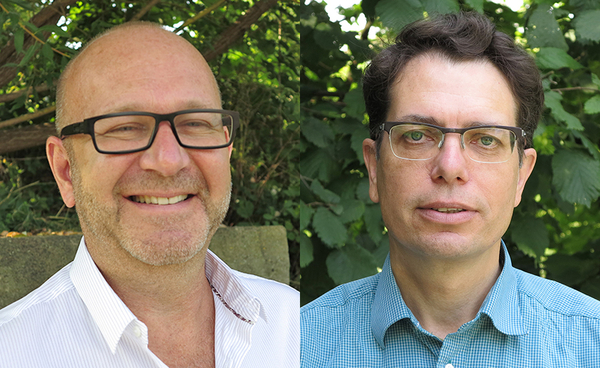Archive detail
Benoit Ferrari new director at the Ecotox Centre, with Etienne Vermeirssen as deputy director
July 1, 2021 |
Benoit Ferrari started at the Ecotox Centre in 2013 as group leader for sediment and soil ecotoxicology. Earlier stations of his research career were the University of Geneva and the Irstea (now: INRAE) in Lyon, France. During his time at the Ecotox Centre, the biologist has been predominantly involved in the development of innovative methods for assessing sediment quality. Benoit Ferrari took over the directorship of the Ecotox Centre ad interim in 2019 from former director Inge Werner, who will retire in August 2021. Etienne Vermeirssen, group leader of Aquatic Ecotoxicology, will continue to support Benoit Ferrari as deputy director of the Ecotox Centre. He is particularly interested in the use of bioassays for the detection of pollutants, in assessment systems for water quality, and in innovative monitoring with passive samplers. While Benoit mostly works at the Lausanne site, Etienne is based in Dübendorf.
What Benoit Ferrari and Etienne Vermeirssen particularly appreciate at the Ecotox Centre are the variety of topics covered and direct exchange with both practitioners and academic researchers. This, they say, means that Ecotox Centre research sometimes has direct consequences for improving environmental health. Examples have included upgrades to wastewater treatment plants and the introduction of effect-based limits for surface waters. "Thanks to the diversity of technical and scientific knowledge present at the Ecotox Centre, we are well positioned here, and I find it very motivating to work with our fantastic team," says Benoit Ferrari. Etienne Vermeirssen is especially excited about the upcoming move of the Ecotox Centre at the Dübendorf site to the new FLUX building. "This will provide us with more space for offices and state-of-the-art laboratories and opportunities for interactions."
Where do the two scientists see the greatest challenges for the work of the Ecotox Centre and applied ecotoxicology in Switzerland? "Particularly important is the continuing work on bioassays that integrate different scales of biological organization (molecular, cellular, individual and population). Also urgently needed are practical and technically sound assessment strategies for environmental quality," says Benoit Ferrari. Etienne Vermeirssen adds, "The implementation of mixture effects in regulatory frameworks also remains a future challenge for us." The same goes for standardization of multiple in vitro bioassays and their data evaluation coupled with effect-based trigger values, he says.
Cover picture: Oekotoxzentrum, Anke Schäfer

